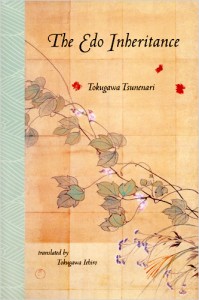By Tokugawa Tsunenari (Eighteenth Head of the House of Tokugawa)
Translated by Tokugawa Iehiro
First English edition / 2009
212 pages / hardcover
ISBN 978-4-903452-14-2
Originally published in Japanese in 2007 by PHP Kenkyuujo as Edo no idenshi.
2,619 yen / Special price*: 1,832 yen (inclusive of tax)
*Special price is applicable for IHJ members.

What was the Edo inheritance? The Japanese have often thought of the Edo period as Japan’s dark ages, when the nation, isolated under the Tokugawa shogunate’s national seclusion policy, fell hopelessly behind the rest of the world. In this book Tokugawa Tsunenari argues that, on the contrary, Tokugawa Japan was in many ways ahead of the West in its long peace and widespread prosperity.
After the anarchy of a hundred years of civil warfare, three extraordinary historical figures ushered in the Pax Tokugawa that lasted 265 years, from 1603 to 1868. Oda Nobunaga destroyed what remained of the medieval order, Toyotomi Hideyoshi brought Japan under a single authority, and Tokugawa Ieyasu, the first shogun, constructed an enduring peace. Under Tokugawa rule control of flooding increased rice harvests, the samurai were transformed into a class of competent and highly moral administrators, and literacy spread. Japan in the eighteenth century was the most urbanized country in the world and boasted the most sophisticated culture of the time.
Writing from his unique perspective as the eighteenth head of the house of Tokugawa, the author points out that a reevaluation of the Tokugawa era is long overdue. Indeed, the solid cultural values fostered during those three centuries of peace—egalitarianism, a small government leaving much to local autonomy, religious tolerance, living in harmony with nature—have much to offer the world in an age of rapid globalization and uncertainty.
From in this volume’s blurb
—Donald Richie
